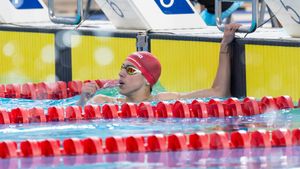Mitch Swepson, once the legspinner of the Brisbane Heat, has made headlines with his recent three-year signing with the Melbourne Stars during the BBL's player movement window. Swepson, 31, served as the acting captain during the previous season, stepping up when Colin Munro was sidelined with injury. Over his decade-long career with the Heat, he played a pivotal role, helping guide the team to the 2023-24 BBL title victory, albeit facing challenges the following season where he claimed only four wickets across nine games, with a notable economy rate of 8.93.
Despite his underwhelming performance this last season, the Stars seized the opportunity to add Swepson, who expressed gratitude to the Heat for his developmental years, stating, “First of all, I'd like to thank the Brisbane Heat for all the opportunities they gave me and kickstarting my T20 career.” He underscored his excitement about joining the Stars, acknowledging the team’s recent strides and his eagerness to work with Marcus Stoinis and coach Peter Moores.
Reflecting on the acquisition, Melbourne Stars General Manager Blair Crouch indicated the decision aligned with the team’s pursuit of securing high-performing domestic talent: “We’ve been on the lookout for a high-performing domestic spinner and Mitch will form an important part of the Stars attack over the next three years.” Swepson becomes a notable asset for the Stars, known for his leadership capabilities and extensive T20 experience, particularly as they seek success in Australia’s domestic league.
Coinciding with Swepson’s signing, the Melbourne Renegades confirmed the acquisition of Hobart Hurricanes opener Caleb Jewell on the last day of the player movement period. Jewell's talent was recognized after he earned acclaim as part of the Hurricanes’ title-winning squad but was traded to the Renegades on a two-year deal. This maneuver aims to bolster the Renegades’ roster as they look to improve for the upcoming BBL season.
Meanwhile, the broader cricket universe watches as several high-profile players remain uncontracted, including Tim David, Mitchell Marsh, and others—awaiting the conclusion of the BBL contracting embargo before re-signing deals can be finalized.
Across the ocean, another significant transaction unfolded with ownership changes surrounding the Northern Superchargers, part of The Hundred competition. The Sun Group—known for owning the Sunrisers Hyderabad—has successfully bid for the entire franchise, making it the first team to be sold outright following the structure of the existing teams. The acquisition sees Sun Group buying both the ECB’s and Yorkshire’s respective stakes for £100 million.
Yorkshire’s chairman, Colin Graves, previously warned about the club’s precarious financial state and likened it to “fighting for survival” amid substantial debts. This sale promises to inject approximately £40 million for the club, allowing for much-needed financial leverage. Graves reflected on the positive outlook with the new partnership, stating, “We are delighted to be entering exclusivity with the Sun Group,” emphasizing the alignment of both entities’ visions.
Holding training camps and strategy meetings, the newly acquired franchise aims to improve performances on the field; having yet to win titles within the competition, the management hopes this change will lead to long-term success.
Sun Group’s portfolio now expands as they add the Superchargers to their growing set of franchises, following successful acquisitions with Sunrisers Hyderabad and Sunrisers Eastern Cape. With multiple IPL affiliations now under their belt, the Sun Group is positioned for strategic dominance within the T20 cricket sphere.
This integration of ownership across leagues signifies the increasing financial commitments and strategic moves being made by franchise owners. The valuation across the current T20 franchise teams is nearing £800 million, and negotiations continue to secure bids for the remaining franchises. Warwickshire has taken significant steps with preferred investor Knighthead, aligning on long-term growth strategies.
The dynamic roster changes and ownership models depict the vibrant yet competitive nature of T20 cricket as teams strive to refine their on-field capabilities and expand their brand presences globally.
Whether it’s through player transfers like Swepson and Jewell or via substantial stakes acquisition as seen with the Sun Group and Yorkshire County Cricket Club, the cricketing world remains on high alert, foreseeing how these moves will shape the future of both domestic leagues and international play.
It’s clear the sport is entering one of its most transformative periods, with teams prioritizing not just talent acquisition, but also strategic partnerships and financial investments as the game evolves.



